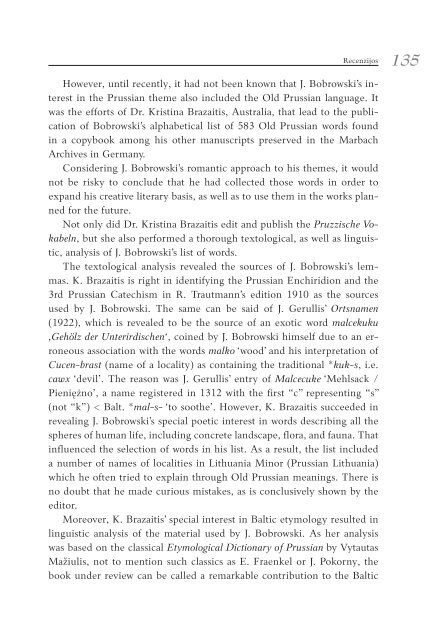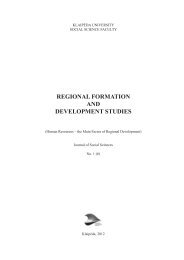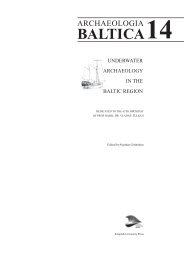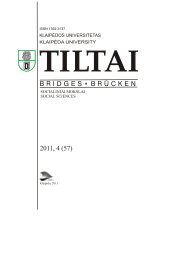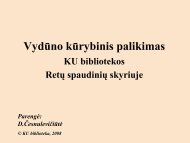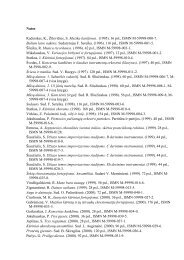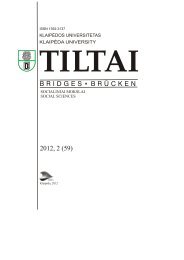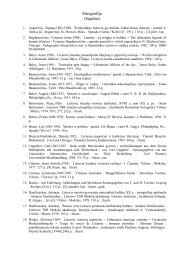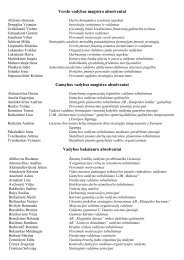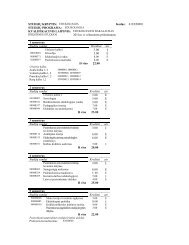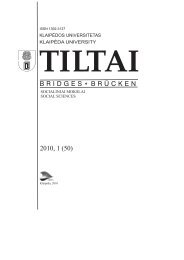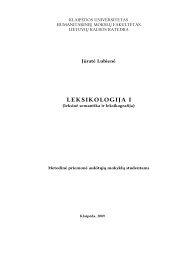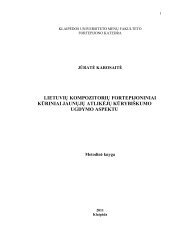visatekstis dokumentas (pdf) - KlaipÄdos universitetas
visatekstis dokumentas (pdf) - KlaipÄdos universitetas
visatekstis dokumentas (pdf) - KlaipÄdos universitetas
Create successful ePaper yourself
Turn your PDF publications into a flip-book with our unique Google optimized e-Paper software.
Recenzijos<br />
However, until recently, it had not been known that J. Bobrowski’s interest<br />
in the Prussian theme also included the Old Prussian language. It<br />
was the efforts of Dr. Kristina Brazaitis, Australia, that lead to the publication<br />
of Bobrowski’s alphabetical list of 583 Old Prussian words found<br />
in a copybook among his other manuscripts preserved in the Marbach<br />
Archives in Germany.<br />
Considering J. Bobrowski’s romantic approach to his themes, it would<br />
not be risky to conclude that he had collected those words in order to<br />
expand his creative literary basis, as well as to use them in the works planned<br />
for the future.<br />
Not only did Dr. Kristina Brazaitis edit and publish the Pruzzische Vokabeln,<br />
but she also performed a thorough textological, as well as linguistic,<br />
analysis of J. Bobrowski’s list of words.<br />
The textological analysis revealed the sources of J. Bobrowski’s lemmas.<br />
K. Brazaitis is right in identifying the Prussian Enchiridion and the<br />
3rd Prussian Catechism in R. Trautmann’s edition 1910 as the sources<br />
used by J. Bobrowski. The same can be said of J. Gerullis’ Ortsnamen<br />
(1922), which is revealed to be the source of an exotic word malcekuku<br />
‚Gehölz der Unterirdischen‘, coined by J. Bobrowski himself due to an erroneous<br />
association with the words malko ‘wood’ and his interpretation of<br />
Cucen-brast (name of a locality) as containing the traditional *kuk-s, i.e.<br />
cawx ‘devil’. The reason was J. Gerullis’ entry of Malcecuke ‘Mehlsack /<br />
Pieniężno’, a name registered in 1312 with the first “c” representing “s”<br />
(not “k”) < Balt. *mal-s- ‘to soothe’. However, K. Brazaitis succeeded in<br />
revealing J. Bobrowski’s special poetic interest in words describing all the<br />
spheres of human life, including concrete landscape, flora, and fauna. That<br />
influenced the selection of words in his list. As a result, the list included<br />
a number of names of localities in Lithuania Minor (Prussian Lithuania)<br />
which he often tried to explain through Old Prussian meanings. There is<br />
no doubt that he made curious mistakes, as is conclusively shown by the<br />
editor.<br />
Moreover, K. Brazaitis’ special interest in Baltic etymology resulted in<br />
linguistic analysis of the material used by J. Bobrowski. As her analysis<br />
was based on the classical Etymological Dictionary of Prussian by Vytautas<br />
Mažiulis, not to mention such classics as E. Fraenkel or J. Pokorny, the<br />
book under review can be called a remarkable contribution to the Baltic<br />
135


